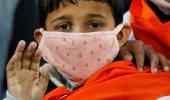To ensure enough food to the poor during the lockdown, the government last week started distributing free 5 kg of rice or wheat per person and 1 kg pulse per household under the Pradhan Mantri Garib Kalyan Yojana to over 81 crore PDS beneficiaries.

Distribution of free wheat grain in place of flour is causing tremendous hardship to beneficiaries registered under the Public Distribution System (PDS) with no way to grind it as local chakkis are shut, owing to a countrywide COVID-19 lockdown.
To ensure enough food to the poor during the lockdown, the government last week started distributing free 5 kg of rice or wheat per person and 1 kg pulse per household under the Pradhan Mantri Garib Kalyan Yojana (PMGKY) to over 81 crore PDS beneficiaries.
This is over and above the monthly quota of 5 kg grains per person being given at subsidised rate of Rs 2 kg for wheat and Rs 3 kg for rice.
With no way to grind wheat, many people do know what to do.
They were hoping free and subsidised ration supplies would ease their worries emerging out of the lockdown.
In most parts of the country, local flour millers and chakki shops are not allowed to operate, while some are not willing to function due to fear of action by the police, which is strictly enforcing the lockdown rules to stop the spread of the disease as the confirmed cases in the country rise to 1,071.
"What do I do with wheat? Nearby chakkis (flour mills) are shut. Where do I convert wheat into flour? What is the point of buying wheat when we cannot consume?" Mustafa (25), a factory worker, told PTI after getting the ration supply from a fair price shop at Sarai Kale Khan in the national capital on Sunday.
Mustafa received 6 kg wheat and 1.5 kg rice for free on Monday and did not get his monthly quota of foodgrains at a subsidised rate in the absence of stock at the depot.
Like Mustafa, many ration card holders -- some were working in nearby factories, some as servants, security guards and rickshaw pullers before the lockdown announced on March 24 -- who got wheat from the ration shop were disappointed.
This was the situation reported in wheat-consuming states of North India even though the central government has given permission to states and Union Territories to supply 'wheat flour' if they wish at their expense.
"Under the PDS, we basically deliver wheat. It is logistically not possible to intervene at a local level by the Government of India.
“However, necessary advisory will be issued to the state governments to look into the matter," Food Secretary Ravi Kant said.
Except for Punjab, Rajasthan and Haryana, most states distribute a mix of rice and wheat through PDS.
However under the PMGKY, mostly rice will be distributed for free, he said.
"It is difficult suddenly to convert wheat into atta (wheat flour) and distribute via PDS. If at all to be done and can be managed, it has to be done at the state level," Kant said.
However, some states like Telangana have taken measures to distribute wheat flour along with rice and some cash to ration card holders who have become jobless owing to the lockdown.
Uttar Pradesh Roller Flour Millers Association President Pramod Kumar Vaish said, "The Centre is distributing wheat at a cheaper rate of Rs 2 per kg, while the cost of converting it into flour and packaging is over Rs 3 per kg."
The Association has sent a proposal to the Uttar Pradesh government that they are ready to provide their service for PDS purpose.
"But, the state administration has not shown interest due to the financial implications it would have on the state exchequer in the absence of a clear central policy," he said.
Vaish said, "There is a problem in distributing wheat in the current situation. How can poor go and get it grinded when chakkis are not open?"
The association cannot intervene as it has big flour millers as its members and not small chakkis at local level, he added.
The only way out now is to allow one or two local chakkis in each locality to operate during the lockdown or install at least one portable chakki near ration depot for converting wheat into flour.
It may be noted that there are over 81 crore poor people registered under the PDS, which comprise two-thirds of the country's population.
Photograph: Ajay Verma/Reuters










